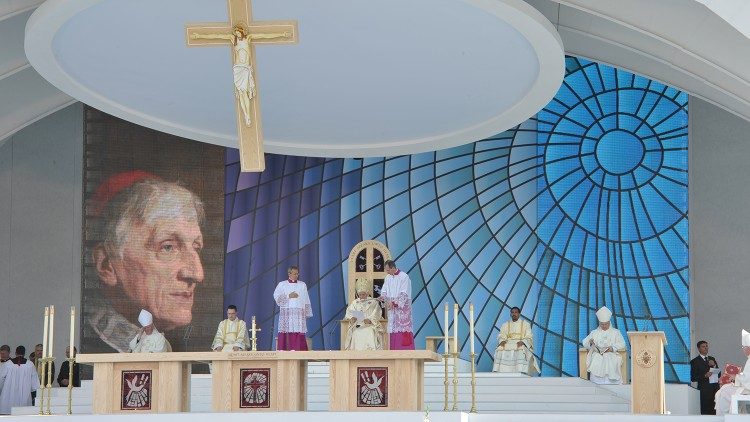Before beatifying John Henry Newman in 2010, Benedict XVI declared to the expectant crowd that “Newman has long been an important influence in my own life and thought.” Two decades earlier, then-Cardinal Joseph Ratzinger had described “my own way to Newman” in commemorating the centenary of the English cardinal’s death. As a seminarian, Ratzinger was introduced to Newman’s theology of conscience and his development of doctrine, the two areas where the saint had made “his decisive contribution to the renewal of theology.”
In particular, Ratzinger continued, Newman “had placed the key in our hand to build historical thought in theology, or much more, he taught us to think historically in theology and so to recognize the identity of faith in all developments.” Ratzinger has spent nearly seven decades as a theologian thinking historically in theology, that is, considering the wondrous interplay between the infinite God and the finite world. His Jesus of Nazareth trilogy is an outstanding example of this, where he examines the impact of the Incarnation on history, and how history has tried to come to grips with the Incarnation.
Given these glowing comments about Newman and their overlapping theological perspectives, we would expect to find direct engagement with and copious citations of Newman’s work within Ratzinger’s vast corpus. But such references are few and far between. In fact, the two focused on different branches of theology. Newman worked on the Church Fathers, the development of Christian doctrine, education, and conscience; while Ratzinger devoted himself first to fundamental theology, revelation, ecclesiology, and then to liturgy and Christology.
Of all these subfields, the development of doctrine and revelation share some ground. Yet in his memoirs, Ratzinger attributed his understanding on revelation not to Newman, but to St. Bonaventure. Ratzinger cursorily mentions Newman’s name once in his 1968 commentary on Vatican II’s Dei Verbum, and it is a curious reference: he attributes Newman’s theory of development to the influence of the Gregorian University in Rome, but Newman wrote his book on the topic before setting foot in Rome.
Given the lack of direct engagement with Newman, it is fair to ask: How exactly did Newman influence Ratzinger? Can we say that because of Newman’s thoughts on a given topic, say, the development of doctrine, Ratzinger thought similarly, and then advanced Newman’s ideas in his own way?
We can find insight into these questions in Ratzinger’s slim volume On Conscience, which consists of two brief conference papers presented in the United States seven years apart. The first essay, “Conscience and Truth,” is divided into three sections, with the second devoted to Newman.

Here Ratzinger proposes Newman, “whose life and work could be designated a single great commentary on the question of conscience,” and his theory of conscience to “sharpen our view of present problems and establish the link to history.” He then uses Newman’s life to answer those who wish to morph conscience into a kind of subjectivism. For his final conclusions on the particulars of conscience, Ratzinger turns to St. Paul and St. Thomas Aquinas, not Newman.
We see from this brief essay that Ratzinger certainly knows the core of Newman as a thinker, and, more importantly, as a man. He writes, “I do not hesitate to say that truth is the central thought of Newman’s intellectual grappling. Conscience is central for him because truth stands in the middle. To put it differently, the centrality of the concept conscience for Newman is linked to the prior centrality of the concept truth.”
Truth is at the core of Ratzinger’s theological and pastoral work – his chosen episcopal motto, an expression of the latter, is Cooperatores veritatis, “Co-workers of the truth.” Ratzinger noted to Peter Seewald that early in his career he “excluded the question of truth, because it seemed to be too great.” But later, “in these years of struggle, the 1970s, it became clear to me: if we omit the truth, what do we do anything for?” Even though pursuing the truth carries with it “menaces and perils,” Ratzinger came to see that “relinquishing truth doesn’t solve anything, but, on the contrary, leads to the tyranny of caprice.”
Then, with his characteristic humility, he adds a thought central to his own theological project: “One can work with the truth, because the truth is a person.”
Newman gave his life to opposing liberalism in religion. Ratzinger gave his to prevent the eclipse of religion by relativism, liberalism’s insidious offspring. Despite the different illnesses of their respective ages, these two theologians offered the same medicine: the truth manifested in the Incarnation of the Son of God.
Ratzinger certainly read Newman, and read about Newman. The specifics of Ratzinger’s theology, however, came from other sources: St. Bonaventure, St. Augustine, and the Tübingen School’s J.G. Geiselmann, among others. Newman’s influence on Ratzinger would come not by way of specific theological axioms, therefore, but by who he was and the theological approach he embodied. This is all the more fitting, since Ratzinger the theologian – and pope – likewise has influenced two generations of Catholics not just by the specific ideas in his books, but by who he is: a humble servant in the Lord’s vineyard who uses the best of the past to enliven Catholicism in the present. In these and several other respects, then, Ratzinger is as much an heir to Newman’s theological project as the direct disciple of Newman’s thinking.
Newman’s theology and personal holiness make him eminently worthy of being named a doctor of the Church, that is, an outstanding teacher who has made a decisive contribution to theology. Though the specifics of his theology diverged from Ratzinger’s, the English saint and the German pope are fellow co-workers in the truth and in sanctity. Perhaps, through Newman’s intercession for his heir, we may see Ratzinger too one day lifted to the same honors.















